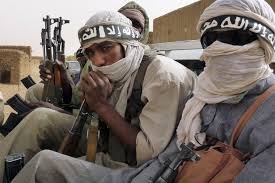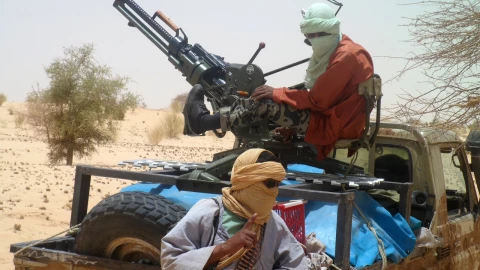“Unless action is taken immediately Sharia will rule”
In my July 10, 2012 Commentary “Mali: A Democracy Destabilized by the Arab Spring”, I noted that the country was in deep trouble, and on the verge of being overrun by Islamists wanting to institute Sharia, the brutal Islamic law.
Today the instability in northern Mali is out of control. The towns of Timbuktu, Kidal and Gao have been overrun by well-armed Islamists, leaving Malians no choice but fleeing to safety. People are just walking away from their homes, leaving everything behind, including their animals which for some is their only livelihood. They flee with the clothes on their backs, and bewildered children clinging to their side. Some are lucky to get a ride, while most proceed on foot to Mauritania where the UN has set up a refugee camp near the border town of Fassala, which has swelled to more than 100,000 Malians. The conditions there provide primitive shelter and minimal food rations.
All of this is reminiscent of the exodus by Afghans to refugee camps in Pakistan after the Soviet invasion. Young students in these camps were indoctrinated by radical imams, in addition to training given by the Pakistani military. It was from these refugee camps that the Taliban (students) evolved, rising to power with financial support from Pakistan and Saudi Arabia.
Today in the Mauritanian refugee camps Islamists are starting to indoctrinate young men to become jihadists and take revenge, saying that the Mali government had killed their relatives. Such Islamist influence can only cease when stability is brought back to northern Mali. Reports indicate there are an additional two hundred thousand Malians that have fled to Niger, Burkina Faso and Algeria.
The Tuareg rebel led separatist movement had for years been a thorn in Mali government’s side. With the flow of weapons from Libya after the Arab Spring Revolution, the Tuareg rebels were able to challenge Mali’s military. Capt. Amadou Sanogo claiming the government did not support the army by supplying them with weapons and equipment to fight the Tuareg rebels led a coup to overthrow President Amadou Toumani Toure on March 22, 2012. In the destabilization that followed the Tuareg rebels associated with Ansar Dine, a growing radical Islamist group, led by Iyad Ag Ghaly who previously had been a leader in the separatist movement. Together they took control of several towns in northern Mali.
Had the UN empowered the Economic Community of West African States (ECOWAS) in March 2012, by sending troops to help fight the Tuareg rebels and Ansar Dine Islamists they could have been marginalized. Instead they control large parts of a region the size of Texas. Reportedly, in a recent power struggle the Tuareg rebel led National Movement for the Liberation of Azawad (MNLA) has been pushed aside by the Ansar Dine fundamentalists who want to impose the strict Sharia law. The northern region of Mali has become a safe haven for terrorist groups, including Al-Qaeda in the Islamic Maghreb, and for radical Islamists coming from Southern Asia.
 Militiaman from Ansar Dine- In Kidal, northeastern Mali. (Photo: Adama Diarra/Reuters)
Militiaman from Ansar Dine- In Kidal, northeastern Mali. (Photo: Adama Diarra/Reuters)
Niger’s President Mahamadou Issoufou recently told Reuters, that Islamists and terrorist groups have opened a new frontier in northern Mali. In the June 7, 2012 article President Issoufou stated “That Afghan and Pakistani jihadis were training recruits for Islamist groups in northern Mali, the latest sign it is slipping into terrorist hands”, and proffered “I see the necessity for a U.N. Security Council resolution on the Mali situation to allow the use of force to restore integrity of Mali’s territory. I am optimistic because Western powers are aware of the danger that threatens them in the Sahel.”
 Islamist fighters- In Gao, northeastern Mali. (Photo: Romaric Ollo Hien/AFP/Getty Images)
Islamist fighters- In Gao, northeastern Mali. (Photo: Romaric Ollo Hien/AFP/Getty Images)
Several West African countries, part of ECOWAS helped broker a transitional government in Mali. They had also considered providing military support which did not take place. Quick military action would have stabilized northern Mali. Instead such action was deferred back to the United Nations Security Council (UNSC) for further review.
On July 6, 2012 the State Department in a press release on the “Situation in Mali”, referred to the UNSC Resolution 2056 adopted on July 5, “which registers the international community's grave concern about the serious threat to the stability posed by the situation there”, and went on to request the interim government “to issue its roadmap for elections without delay so that preparations can begin in earnest to restore democratically elected civilian governance to Mali prior to May 2013....”
The press statement also admonished Capt. Sanogo to “refrain from any interference in political matters and in the work of the transitional authorities”, and called upon “the rebel groups in northern Mali to renounce any connection with terrorist groups and enter into legitimate political negotiations”. This rhetoric only emboldened the Islamists to carry on with their chaotic acts. The United States should have pressed the UNSC for immediate action, which would save many lives, and prevent the displacement of thousands of Malians. Even a quick response back in April 2012 would have put the democratic election process back on track within a few weeks.
The UNSC Resolution called for more fact finding data, while the human atrocities and destruction of irreplaceable shrines continues unabated. Interestingly the U.S. pressed for fast action for regime change in Tunisia, Egypt and Libya without an endgame plan, while in Mali the endgame was about stability in a democratic country. Underpinning this fledgling democracy and marginalizing the radical Islamists was paramount, and should have been the goal.
On July 20, 2012 Reuters noted “The United States has called on Mali's authorities to accept offers by African states to send a military force to stabilize the country and help retake control of its vast northern desert, now in the hands of al-Qaeda-linked Islamists”. The article continued, “The ECOWAS bloc has said for months it wants to send a 3,000-strong force to tackle instability but it has so far not received backing from the United Nations and met resistance from politicians and soldiers in Mali”.
During a visit to Bamako, the capital of Mali on July 19, 2012, Johnnie Carson, the U.S. assistant secretary of state for African affairs, said that "Mali should accept the force, whether they are soldiers, police or gendarmes, which have been generously offered by ECOWAS". According to the Reuters article the UNSC has been reluctant to back military intervention without a clearer plan for the use of force.
Political insiders have told me they would support whatever it takes to establish stability in Mali’s northern region, by marginalizing the Islamists and expelling the foreign jihadis who have infiltrated the region. They were emphatic that Mali needs to be reunited, and the presidential elections be put back on track immediately. It was also important that the destitute Malian refugees come back as quickly as possible and resume their lives in peace. Going forward the nascent Tuareg society needs to have a broader representation in the governing process.
In the CNN Global Public Square article on July 18, 2012, “Clinton’s legacy: Libya or Syria?” Paul Wolfowitz and Mark Palmer pointed out that, “Secretary Clinton was able to prevent Libya from becoming a stain on the Obama administration’s record, the way that Rwanda was for President Clinton....” I believe the inaction in Mali will become a stain on the Obama administration’s record in sub-Saharan Africa. Especially in light of stated pillars that serve as the foundation of U.S. policy toward Africa, namely “support for democracy and the strengthening of democratic institutions on the continent, including free, fair, and transparent elections” and “conflict prevention, mitigation, and resolution”.
For further information about sub-Saharan Africa, al-Qaeda’s impact there, and the challenges I faced as U.S. Ambassador to Mauritius, Seychelles, and Comoros, please refer to my book “When the White House Calls”.
Related Articles:
Reuters
US urges Mali to accept African force
July 20, 2012
http://af.reuters.com/article/topNews/idAFJOE86J09O20120720?pageNumber=1&virtualBrandChannel=0
CNN
Clinton’s legacy: Libya or Syria?
Paul Wolfowitz, Mark Palmer | CNN Global Public Square, July 18, 2012
Secretary Clinton was able to prevent Libya from becoming a stain on the Obama administration’s record, the way that Rwanda was for President Clinton and that Bosnia was for both him and the first President Bush. Why, then, is she repeating those earlier mistakes in Syria?
http://aei.org/article/foreign-and-defense-policy/regional/middle-east-and-north-africa/clintons-legacy-libya-or-syria/